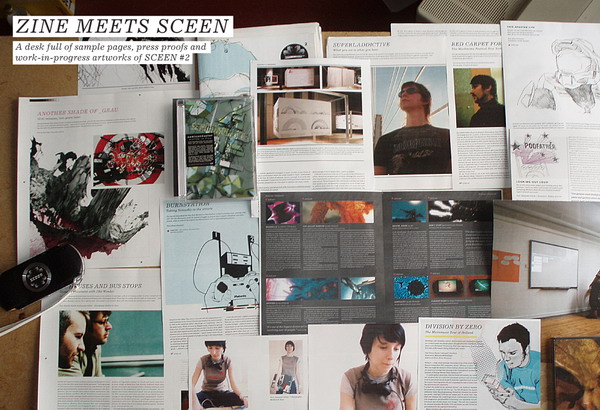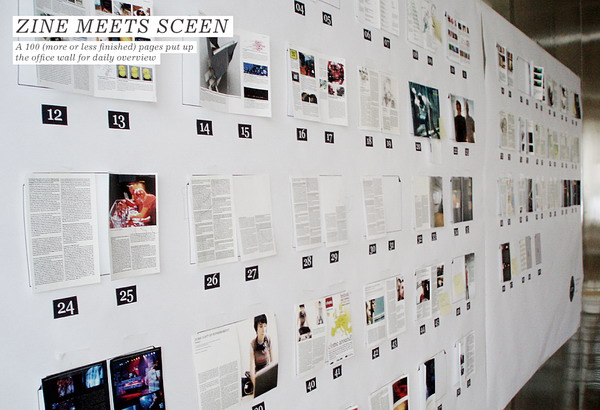|
|
|
|
|
|
SCEEN: The story behind the delay |
|
|

Alexander 'Monroe' Scholz, editor-in-chief of SCEEN

ZINE meets SCEEN: A desk full of sample pages, press proofs and work-in-progress artworks of SCEEN #2

ZINE meets SCEEN: A hundred (more or less finished) put up on the office wall for daily overview
It doesn't happen very often that a demoscene magazine gets respected in such epic proportions as SCEEN does. After a stellar first issue in September 2005 and an announcement that issue two would follow "soon", there was quite some silence. Too much of it even. Issue two never came and should indeed finally have wrapped by the time you're reading this.
ZINE tracked down Alexander 'Monroe' Scholz, editor-in-chief of SCEEN to find out just what exactly happened.
The beginnings
"The starting point for SCEEN must have been Breakpoint 2003", explains Scholz. "Back then I toyed with the idea for a little while already, but experiencing the first Breakpoint really kicked things into place. The whole project continued to take shape in 2004 and by the end of that year we had an editorial team and a big online portal about digital arts ready -- which never went online, unfortunately. We realized that our resources couldn't sustain both, a complex online portal with daily coverage and a print magazine. Pity!"
The editors have this claim going that pretty much sums up the motivation of the team: "Debating the rapid development of digital technology and the ephemeral nature of web information, SCEEN seeks to decelerate and dissect the cosmos of digital art and culture, down to pure ideas, emotions and personalities and bridge the analogue-digital divide." That's quite a long claim indeed.
"It's the idea of unplugging, pausing and getting engaged with something more substantial than blog noise and YouTube flicks", elaborates Scholz. "Something that people took time for putting together and that is worth spending time with. Something that lasts longer than the daily top five posts on a newssite. Something of value, where all pieces from the specific kind of paper used to the exclusive illustration made are carefully chosen. It's about bringing convenience to the abstract cosmos of digital art and enjoying the magazine as an haptic, holistic real-life experience. Analog meets digital. As they both belong together. So in a way the magazine is a declaration of love for both."
The creation of what ended up being a 72-page print magazine with a DVD wasn't without obstacles on its way to completion. "Finding a publisher who understands and shares the vision and getting the right people aboard definitely belonged to our main ones", admits Scholz. "Both of these obstacles keep coming up more or less", he adds with a smile.
Scholz spent probably half a year looking for talented editors within and beyond the demoscene. He approached each and everyone directly, introduced them to the project and invited them to join in. Some of the newer editors came along after the release of SCEEN #1, keen to be part of it. And the call is still open. Anyone who's interested to contribute in one way or another is very welcome to do so. In fact, the team needs more talented people to get the magazine up to the right frequency.
While SCEEN certainly addresses anybody who has a certain interest in digital art and culture, the publication is specifically for those who want to delve a tad deeper into things, really wanting to get to know artists, to understand concepts and ideas. Among this audience we find demosceners as well as programmers, animators, filmmakers, VJs, musicians, hackers, circuit benders, creative gamers and general media artists. And a lot of people who aren't any of those. "Actually, we couldn't be happier about the diversity of the audience", explains Scholz. "Because that way, works of such exceptional sub-cultural movements as the demoscene reach people who already have all it takes to be infected -- and hooked for good."
Delicate delays
And then we get to the delicate subject - the delay of issue two. "A serious lack of ressources mixed with the utter stubbornness about quality" could be described as the main reason for the delay, according to Scholz. "As you probably know, SCEEN has no budget whatsoever and is completey put together in spare time. Having no budget means being 100% dependent on goodwill of external contributors. In the first place you have to find contributors. And I'm not necessarily talking about editors, but also translators, proofreaders, illustrators and photographers. The more professional the contributors are the less time they have available. In fact, SCEEN would be impossible if some of us didn't work freelance, having the luxury to slip in extra days here and there exclusively for the magazine. Bottom line is: The big chunk of work is done by very few people. And few means two in our case. And if at least one of the two is rather demanding with quality you have a problem. Moritz Sauer (phlow.net), one of our editors, said to me a while ago: 'Loosen up, Alex. The readers don't care that much about quality, they just want to have something to read once in a while.' And while he may be right to some degree, I still refuse to release anything mediocre or sub-standard. I have a hard time compromising quality, I admit. I'd rather spend night after night refining something over and over again." And before we can say anything, he adds: "Yes, I know that this can be counterproductive."
The continuing delay necessarily provoked some reactions by readers who had partly even subscribed to the magazine by that time. "Of course people kept asking for the follow up issue. And they still do. Rightfully so. I take these inquiries very seriously and try to reply immediately and profound. Fortunately there haven't been many negative vibes to date. Some people even ask me for an interview after all this time. Can you believe that?" Indeed, ZINE admits that this can happen occasionally. "However, I'm confident that issue #2 will make up for the delay to some degree. We put so much work in it over the last two years. And I hope it shows."
Keen interest also was shown from people outside the scene. Those that Scholz actually spoke to were really intrigued by that thing called demoscene. Some of them argued a lack of balance, though. A lot of articles were built around demoscene subjects and obviously, non-scene readers really wished for a wider editorial spectrum. Scholz agrees with this to some extent.
"We hope that people from both within and outside the scene see a part of themselves in the magazine. Be it through specific articles, a common pool of interest or the sheer nerdy attitude of it. In order to achieve that, we keep trying to blend an interesting mlange of scene and non-scene highlights. An intermixture that is exciting and inspirational for everybody."
However, people who weren't members of the scene had little to none understanding of it. "But we didn't really have that many external i.e. non-scene contributors, anyway", puts Scholz the info into perspective. "A fact that actually became a problem later on, when we wanted to tackle other areas of interest. As a matter of fact, I wrote more than 60% of the articles (and edited another 20%) in SCEEN #2 for the simple reason that we did not have editors familiar with non-scene subjects like VJing, for example. But even with demoscene subjects the choice of experienced scene editors (from diskmags for example) to put on the job isn't always a easy one, because they tend to have a hard time keeping the non-scene part of the audience in mind. I can't blame them; it is really difficult to make a demoscene feature interesting to the demanding scene audience while keeping it accessible and a good read for a non-scene audience. Accordingly, some of the feature articles have taken weeks to finish. Yes, we really take this mediator position of ours seriously."
This passionate dedication not to make compromises in quality also takes its toll. Delays mentioned earlier are almost a given in such a case, leading to the question what the team does to avoid future delays.
"We did a lot of debugging on the project and ended up with a number of conclusive to-do's to prevent future delays", elaborates Scholz. "At the top of the list is a bigger and much more diverse pool of capable editors. Writers who have insight in specific subjects while maintaining a good grip for the big editorial picture. Same goes for the rest of the staff, such as working with more reliable translators and proof-readers for example. Also, some sort of budget might help a lot. SCEEN turned pretty much into a fulltime affair for me. But you have to have that time in the first place. As for now I pretty much work day and night to both sustain myself and work on the magazine. That's obviously no basis for professional editorial work or a regular release schedule.
Reaching out
And as SCEEN #2 finally sees the light of day, preparations for SCEEN #3 are already well underway. "If we manage to solve some of the issues above we're confident to publish SCEEN #3 by the end of the year." Is the goal too ambitious considering that SCEEN #2 took almost 2 years to complete? "Editorial planning and research have begun already. Fingers crossed!"
The team is not going to steer away from the path is has chosen though. Reaching out to new audiences is and will remain an integral part of the magazine. "I absolutely believe that it is crucial for the demoscene to look and reach beyond its boundaries, dogmas and prejudices. The cosmos of digital art -- from blunt NES hacks by Ben Heck to audiovisual installations by Marius Watz -- is a beautifully rich one. It's shame that many demosceners don't really know, care or participate. Seriously, while the demoscene spawns some of the most fascinating works I've ever seen it also hosts some of the most narrowminded, ignorant blokes I've ever ran into. Some of them seem to think they have a patent on 'doing something creative with the computer'. While the hermetically sealed monoculture grows a charming family structure it also keeps fresh impulses, new ideas and eventually new people out - something that couldn't be more fatal in a time when young talented people have literally thousands of tools and channels available to create and share audiovisual output."
More info about SCEEN can be found at www.SCEEN.org.
Go back to articlelist |
|
|
|

